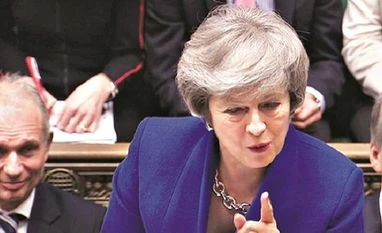Embattled British Prime Minister Theresa May claimed to have secured the breakthrough required to get her Brexit withdrawal agreement through a crunch vote in Parliament on Tuesday, two weeks ahead of the country's divorce from the EU.
However, with UK Attorney-General Geoffrey Cox confirming that the legal risk from the controversial Irish backstop "remains unchanged", her Conservative Party's hard-Brexiteers refused to back the so-called "improved" divorce arrangement, leaving Britain's exit from the European Union (EU) still precariously poised ahead of the March 29 Brexit deadline.
In a last-minute dash to the European Parliament in Strasbourg, France, on Monday night, May emerged alongside European Commission President Jean Claude-Juncker to declare that the UK and EU have agreed “legally binding” changes to the controversial Irish backstop clause to ensure any such arrangement would not be permanent.
The move was aimed at addressing the concerns of hard-Brexiteers in her own Conservative Party and the Northern Irish Democratic Unionist Party (DUP), which provides her government with its majority in the House of Commons.
"MPs were clear that legal changes were needed to the backstop. Today we have secured legal changes. Now is the time to come together to back this improved Brexit deal," May said at a joint press conference with Juncker.
Brexiteers from within her party and the DUP had refused to comment if they feel the changes she has secured will be enough for them to vote in favour of the deal before they take full legal advice on the changes.
In his official advice as the country's chief legal advisor, Attorney General Cox said the extra assurances won by May do "reduce the risk that the United Kingdom could be indefinitely and involuntarily detained" in the backstop if talks on the two sides' future relationship broke down due to "bad faith" by the EU.
However, he reiterated that the "legal risk remains unchanged" that if no such agreement can be reached due to "intractable differences", the UK would have "no internationally lawful means" of leaving the backstop without EU agreement.
The Brexit-backing European Research Group (ERG) within the Tory Party declared soon after that it will not be voting for the withdrawal agreement in the Commons later, in a major blow to May's leadership.
In a statement, the ERG said: "In the light of our own legal analysis and others we do not recommend accepting the government's motion today." The parliamentary arithmetic at this stage seems to be titled against Theresa May even though many of her Cabinet ministers have been publicly trying to drum up support for the deal to be passed through the Commons. May also addressed a meeting of Conservative MPs in an effort to change the minds of those opposed to her deal and many seem to have agreed to switch their no during a Commons vote earlier this year to a yes on Tuesday.
Earlier, the EU had said it had made significant concessions as two additional documents were agreed to back up the withdrawal agreement struck in December last year.
It is a joint legally binding instrument which the UK could use to start a "formal dispute" against the EU if it tried to keep the UK tied into the backstop indefinitely and a joint statement committing both sides to find an alternative to the backstop by the end of the Brexit transition period of December 2020.
"In politics, sometimes you get a second chance. There will be no third chance… it is this deal or Brexit might not happen at all," Juncker said, issuing a stark warning to Britain's MPs over the importance of the parliamentary vote in the UK on Tuesday.
Ireland's Indian-origin Prime Minister, Leo Varadkar, also stressed that the new agreements were an "unambiguous statement" of both sides' "good faith and intentions" even if they did not "undermine" the principle of the backstop or how it might come into force.
The Irish backstop, an insurance policy designed to maintain an open border on the island of Ireland between UK territory Northern Ireland and EU member-state – the Republic of Ireland – has been the biggest sticking point for many MPs in the UK who voted against the withdrawal agreement tabled by May in January, by a massive margin of 230 votes.
The historic bruising for May had led her to seek changes to the agreement in order to table a second "meaningful vote" before Parliament that would stand a better chance of being voted through.
The Opposition Labour Party, meanwhile, has declared that the British Prime Minister has secured nothing new.
If the deal fails to pass through yet again, May's previously set timetable is set to kick in – with MPs given a vote by Wednesday on leaving the EU without any agreement in place, which is expected to be defeated because there is very little support for such a no-deal Brexit option. All eyes will then be on another Commons vote, expected by Thursday, in favour of delaying the March 29 deadline.
The March-end deadline had kicked in when the UK triggered Article 50 of the Lisbon Treaty following a referendum in favour of Brexit by nearly 52 per cent to 48 per cent – or 17.4 million votes to leave the EU as opposed to 16.1 million to remain in the 28-member economic bloc – in June 2016.
Unlock 30+ premium stories daily hand-picked by our editors, across devices on browser and app.
Pick your 5 favourite companies, get a daily email with all news updates on them.
Full access to our intuitive epaper - clip, save, share articles from any device; newspaper archives from 2006.
Preferential invites to Business Standard events.
Curated newsletters on markets, personal finance, policy & politics, start-ups, technology, and more.
)